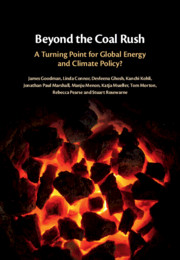Book contents
- Beyond the Coal Rush
- Beyond the Coal Rush
- Copyright page
- Contents
- Figures
- Tables
- About the Authors
- Foreword
- Acknowledgements
- Introduction
- 1 The Global Contest over Coal and Development
- 2 India
- 3 Australia
- 4 Germany
- 5 Laying the Foundations of the Coal Rush
- 6 Kyoto and the Coal Boom
- 7 Coal in a Climate-Constrained World
- 8 Conclusion
- References
- Index
5 - Laying the Foundations of the Coal Rush
The Post-war ‘Coal–Industrial Complex’
Published online by Cambridge University Press: 06 November 2020
- Beyond the Coal Rush
- Beyond the Coal Rush
- Copyright page
- Contents
- Figures
- Tables
- About the Authors
- Foreword
- Acknowledgements
- Introduction
- 1 The Global Contest over Coal and Development
- 2 India
- 3 Australia
- 4 Germany
- 5 Laying the Foundations of the Coal Rush
- 6 Kyoto and the Coal Boom
- 7 Coal in a Climate-Constrained World
- 8 Conclusion
- References
- Index
Summary
Chapter 5 charts the post-1945 history of energy policy in India, Australia and Germany, focussing on the strengthened state-corporate ‘coal-industrial complex’. All three, in their different ways, highlight the centrality of national development models in conditioning outcomes. The present-day dynamics, in the face of climate change, reflect historically sedimented tendencies. Across the three countries coal-centred fossil fuel developmentalism became deeply entrenched in the aftermath of the Second World War. The national state was a key agent in this process, which saw coal maintain and extend its role in power generation. The task of capitalising coal reserves, as a critical asset for economic development and energy security, was taken up by a range of newly formed state agencies. The state-led push for coal was later was accelerated by the 1970s’ Oil Crisis, which again positioned coal as the fossil fuel of choice into the 1980s. The neoliberal revolution from the 1980s brought more transformations, privatizing an already highly concentrated and entrenched industry, strengthening its influence over climate policy. The chapter outlines these shared themes at the global and national state level that entrenched a relatively durable ‘coal-industrial complex’ in each of the three countries.
- Type
- Chapter
- Information
- Beyond the Coal RushA Turning Point for Global Energy and Climate Policy?, pp. 156 - 172Publisher: Cambridge University PressPrint publication year: 2020

